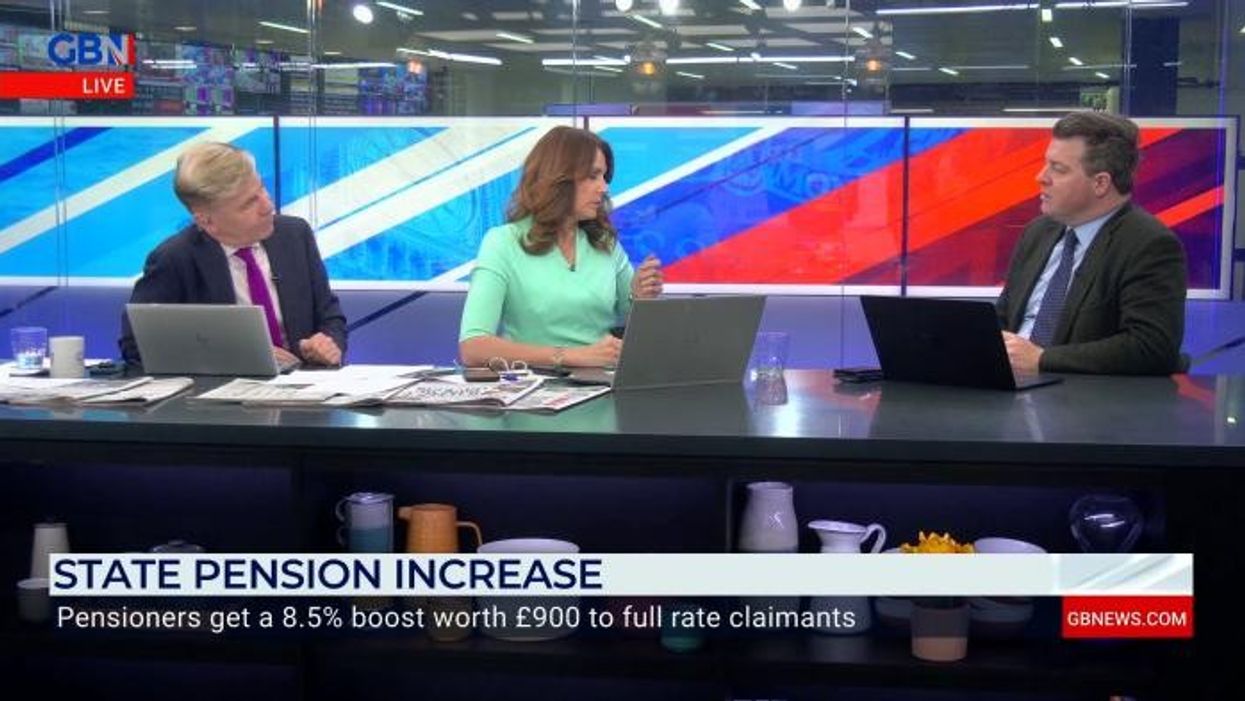Thousands of pensioners will be hit with income tax bills for the first time as their state pension increases by 8.5 per cent
Don't Miss
Most Read
Trending on GB News
Stealth taxes will wipe out more than three-quarters of the state pension triple lock rise, new analysis has revealed.
On April 6, 12 million retirees received an 8.5 per cent increase to their state pension because of the triple lock.
The full new state pension has risen to £221.20 per week or £11,502.40 per year in the 2024/25 tax year, leaving just over £1,000 of the personal allowance.
Those on the basic rate, who reached state pension age before April 2016, will get £169.50 a week or around £8,800 a year.
The full new state pension will rise by around £900 per year, while the full basic state pension will increase by £691 per year.
Despite the increase being worth an extra £900 per year for people on the full new state pension, pensioners will be just £20 better off in real terms this year after their triple lock increase was all but wiped out by Jeremy Hunt’s stealth tax raid, the Resolution Foundation said.

Stealth taxes will wipe out more than three-quarters of the state pension triple lock rise, new analysis has revealed
GETTY
A significant amount of this increase will be taken back by the Government due to the fiscal drag.
The Government has announced cuts to National Insurance, but the think tank highlighted that eight million pensioners will still face a hit to their income as pensioners don’t pay National Insurance.
With around 1.6 million pensioners being forecast to be dragged over the income tax threshold by 2027-28, Dean Butler, managing director at Standard Life, has shared some ways Britons can try and cut their tax bill and claw back more of their money.
Tax brackets
Any earnings below £12,570 are usually tax free, but once people start earning more, they could be charged up to 45 per cent in tax
- 12,570 - £50,270 will pay a rate of 20 per cent
- £50,271 and £125,140 will pay a rate of 40 per cent
- Over £125,140 will pay 45 per cent
With the personal allowance threshold frozen until 2028, the increase in state pension will drag pensioners into paying more tax.
Mr Butler said: “For better-off pensioners paying the higher rate of tax, the extra £17 they receive each week as a result of the increase is worth less than £11 when tax is taken into account.”
He warned pensioners need to watch how near they are to the next tax bracket.
If someone currently earns close to £50,270, a £900 increase could push them into the next rate, meaning they start losing 40 per cent to tax.
Private pension withdrawals
With an increase in the state pension, pensioners may be able to delay taking money out of their private pensions, giving it more time to grow.
Britons can also factor in any annuities, defined benefit pensions and spreading out their tax-free lump sum.
Mr Butler said: “In most cases, pensions offer the ability to withdraw 25 per cent tax free.
“You don’t have to take all of this money in one go, and by spreading the sum over multiple years, you can help keep your taxable income below the different tax thresholds.
“If you’re just accessing the tax-free element of your pension, the remainder also has the potential to grow over time if left invested.”
Salary sacrifice
Salary sacrifice is a government-backed scheme that involves an employee agreeing to give up some of their (pre-tax) salary and move the amount they would otherwise receive into a benefit that’s “non-cash” based, such as pension contributions, one-off purchases, and travel.
By earning less money, people pay less tax.
Mr Butler said the same applies to bonuses. He added: “If you get a work bonus, you might have the option to put some or all of it into your pension.
“Doing this could save on tax and National Insurance deductions, meaning you get to keep more of your bonus in the long run.”
Take less from your drawdown
Britons can drawdown from their private pensions by the same amount that the state pension increases if they are living comfortably in retirement.
By doing this, pensioners can avoid tax on money they don’t need yet and they can also leave that money in their account to keep growing.
Defer the state pension
The state pension doesn’t need to be claimed at state pension age.
For each nine weeks someone defers the new state pension, they will get an extra one per cent when they do claim it.
Pass down pensions
There is no inheritance tax to pay on pensions, so if someone dies before their 75th birthday, a loved one won’t need to pay income tax on it as long as it’s passed on within two years.
If someone has a pension they don’t yet need, they could avoid paying tax on it by leaving it as an inheritance.
If they die after the age 75, or it’s accessed after more than two years, inheritance tax still will not be due, but income tax will be at the marginal rate of whoever inherits it.








